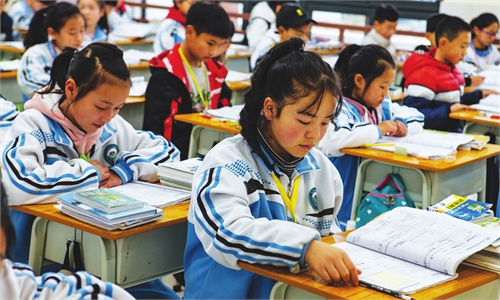
Wangmo county, Southwest China's Guizhou Province Photo: VCG
Liu Xiuxiang left the mountains of Southwest China's Guizhou Province to study in college, and was offered opportunities to stay in eastern big cities. But he chose to go back to the mountains and has since become a witness to the great elevation of his hometown in the last decade.Liu himself was a great example of those who benefited from the changing tides of the country's development, and his experiences stand as testament to China's achievements in poverty alleviation.
Liu's story is a great example of how the Communist Party of China (CPC) provides decisive plans to accelerate the poverty alleviation process. Such examples are called the "Chinese method" or "Chinese achievement." In the globalized world, our poverty alleviation is a part of the worldwide anti-poverty movement. As we have proven with the Chinese method, it is a valuable experience and a possible reference answer for the whole world.
It proved that CPC is a party of wisdom. Its policies are also people-oriented.
Since the 18th National Congress of the CPC in 2012, eliminating extreme poverty has been a clear goal accompanied by a series of policies. In the last millennium of China's history, poverty was a persistent problem that seemed to have no solution. However, in recent decades, the CPC has created solutions for the long-abiding problem.
Guizhou, once one of China's least developed regions, has a new look now. The province's GDP hit 1.96 trillion yuan (about $310 billion) in 2021, up 8.1 percent year-on-year, at par with national GDP growth, according to the Xinhua News Agency.
After years of development, Guizhou has evolved into a national big data hub, with increasing investment in new infrastructure such as data centers.
Rural vitalization and common prosperity are the next goals to be achieved. Education can also play a role in this step.
Education is of critical importance to the future of the country and the Party. What kind of people we should cultivate, how, and for whom - these are the fundamental issues that education must address, read the report to the 20th National Congress of the CPC.
"We will accelerate high-quality, balanced development and urban-rural integration in compulsory education. We will better allocate educational resources across regions, strengthen public preschool and special needs education, ensure the diversified development of senior secondary schools, and improve the financial aid system so it covers students at all stages of schooling," it read.
To achieve rural vitalization, China needs skilled personnel for all industries. In recent years, governments invested a lot in village education, which included teacher resources, school construction, fundamental facilitation, and so on.
Earlier this year, the State Council, China's cabinet, released a guideline to clarify Guizhou's strategic role as a model for comprehensive reform in the development of western China, and encouraged the province to blaze new trails in rural vitalization, the development of a digital economy, and the construction of an ecological civilization.
Specifically, the guideline called for accelerated reform for the market-based allocation of production factors and the comprehensive improvement of the business environment. Rural vitalization and new urbanization should be pushed forward in Guizhou, with a focus on boosting modern and efficient agricultural production in mountainous areas, the guideline said.
Highlighting the importance of a modern industrial system led by the digital economy, the document urged for efforts to enhance scientific and technological innovation, upgrade traditional industries, and facilitate the development of culture and tourism industries.
Just as in the story of Liu, the great educational input brings more human capital to propel rural vitalization and common prosperity. It is inspirational that Liu put communal wellbeing over self-advancement - he returned to his rural roots and he chose to be a part of the region's pedagogical development, a noble and meaningful endeavor.
Improving human capital plays an important role in alleviating poverty. Educational levels are directly and positively linked to living standards. Liu did a great job of bringing his expertise back to his hometown and helping more people to gain an education and achieve common prosperity, which is an important step in poverty alleviation.
Poverty eradication is a global topic, and education is one of the most significant methods in such efforts. Education not only changes personal perspectives but also changes the "culture of poverty." As people gain more knowledge and abilities, they are able to increase productivity and bring more value to society, and improve their living standards.
The article was written based on an interview with Yu Shaoxiang, chief research fellow with the National Institute of Social Development at the Chinese Academy of Social Sciences.

